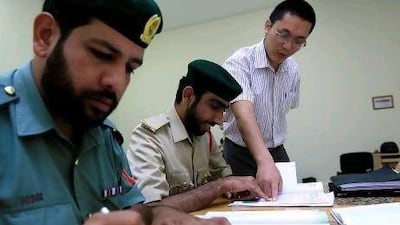DUBAI // Dubai Police officers are being taught Mandarin to help them communicate with the growing number of residents from China.
China's Embassy in Abu Dhabi says there were about 200,000 of the country's expatriates in the UAE last year, and that number is increasing rapidly.
Thirteen officers from various departments in the force have joined the second class at the University of Dubai's new Confucius Institute.
Abdulqadir Tamimi, 39, an airport operations officer who has been with the police since 1997, said he was surprised to be told he would be learning Chinese, but he saw the growing need for it.
"In my job, we get calls from all different people of many nationalities and we need to know how to help them, if they need an ambulance, if there is a problem," Mr Tamimi said.
"This is important for us. A long time ago there were no Chinese here but now there are many more. You find them in areas like around Dragon Mart and many incidents happen where the people sent to deal with these incidents need to be able to communicate."
Abdulrahman Al Mehairi, 24, an emergency response officer, said: "There are many Chinese here and we need to be able to respond to problems such as labourer strikes."
The officers will study for 20 hours a week for three months, learning about Chinese history, culture and even currency.
The University of Dubai's Confucius Institute, which opened last year, is the second in the UAE. The first opened in Zayed University in the capital in 2010.
The Institute is a Chinese government "soft power" project, akin to the British Council or the Alliance Francaise, aimed at promoting Chinese culture abroad.
Dr Christopher Brown, director of international programmes and study abroad at Zayed University in Abu Dhabi, was one of the founders of the first UAE branch.
The capital's campus now teaches 70 students from the university and 30 members of the public.
Dr Brown believes the demand is there for the institute to expand but the resources are not, for now.
"We're hindered largely by the slow growth of our staff," he said. "We're only able to offer three classes in Dubai, as opposed to eight in Abu Dhabi."
Dr Brown admits it is unusual to have two Confucius Institutes in such close proximity, but says this reflects this growing influence of the language and community from the world's most populous nation.
Jichao Zhang, one of the two teachers in Dubai, points out that countries such as Canada, the US and Thailand have two or more institutes.
"Dubai is the most modern city in the region," Mr Zhang said. "It's the most important city for economy and finance so it must have something to do with this.
"All of the Chinese businessmen come here doing business so the country needs people who can deal with the Chinese."
And Chinese may grow to be more important than English.
"English is a universal language but Chinese will be the future language. Everyone knows that," Mr Zhang said.
Hemmat Lashin, who teaches Chinese culture, said most of the the demand came from the Dubai Government.
"They want to make communication easier with the Chinese communities," Ms Lashin said.
The institute has also trained staff at the Department for Economic Development among the 120 people who have undergone training so far, including 10 from the University of Dubai.
Amal Mohammed, 23, an airport administrator and one of two female police officers on the course, has had to take care of Chinese women being deported or in trouble at the airport.
"So many Chinese come here and it will make it a nicer place if people can communicate with them," Ms Mohammed said.

